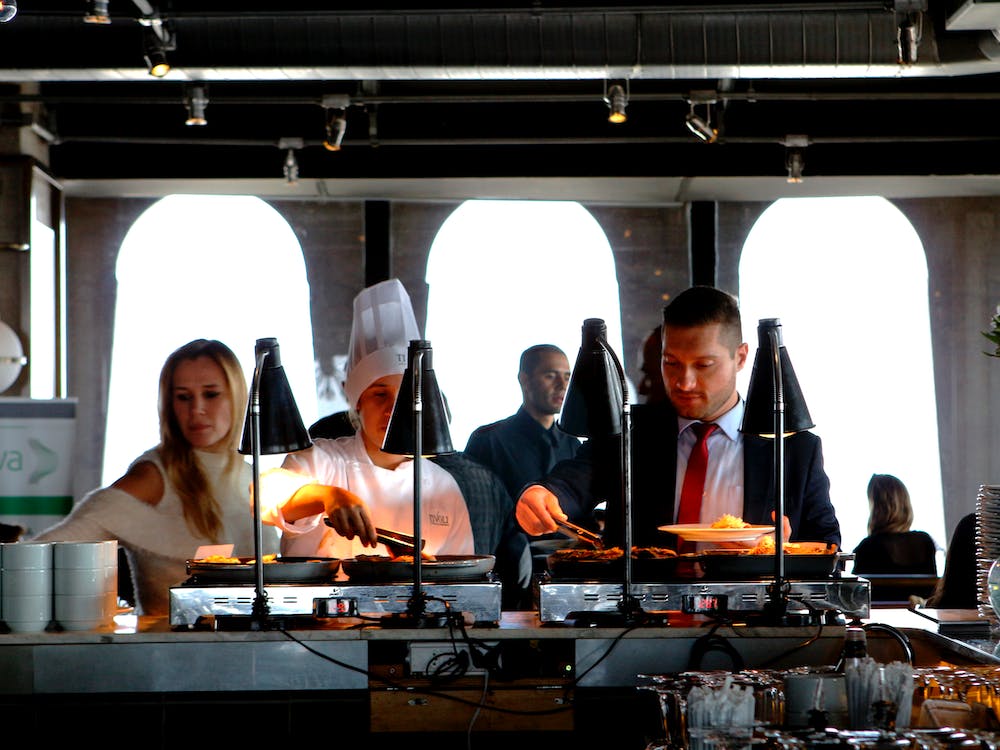
How to Cater for Different Dietary Needs at Stag Dos
Welcome to our guide on how to cater for different dietary needs at stag dos, where we’ll explore practical tips and strategies for accommodating diverse dietary preferences and restrictions during pre-wedding celebrations. Stag dos are a time-honored tradition, offering grooms-to-be a chance to celebrate with their closest friends before tying the knot. However, ensuring that everyone can enjoy the food and drinks provided requires careful consideration of various dietary requirements.
When planning a stag do, it’s crucial to take into account the dietary needs and preferences of all attendees. Whether someone is vegetarian, vegan, gluten-free, lactose intolerant, or has specific food allergies, providing options that cater to a range of dietary restrictions is essential. Check out our guide on how to plan a stag do that everyone will enjoy for tips on creating a menu that accommodates different dietary needs while still offering delicious and satisfying options for all.
Creating an inclusive environment at the stag do is paramount to ensure that everyone feels welcome and valued. Learn how to foster an inclusive environment at stag dos for tips on promoting camaraderie and bonding among attendees. Additionally, making stag dos fun for guests of all ages is essential for ensuring that everyone can participate and enjoy the festivities. Explore our tips on how to make stag dos fun for all ages to ensure that no one feels left out of the celebration.
Even if you’re working with a tight budget, there are still plenty of ways to host a fantastic stag do without breaking the bank. Discover budget-friendly ideas and activities to incorporate into your pre-wedding celebration without sacrificing quality or enjoyment. From stag do games to outdoor adventures, explore our recommendations for hosting a budget-friendly stag do that’s both memorable and affordable.
By taking into account different dietary needs and preferences, you can create a stag do that’s inclusive, enjoyable, and memorable for everyone involved. So get ready to plan a pre-wedding celebration that leaves the groom-to-be and his friends feeling happy, satisfied, and ready for the big day.
Consider Dietary Restrictions and Allergies
When organizing a stag do, it is vital to take into account the dietary restrictions and allergies of the participants for their safety and enjoyment. Here are some key points to remember:
- Prior to the event, make sure to inquire about any dietary restrictions or allergies the participants may have.
- Offer a diverse range of food and drink options that cater to various dietary needs, including vegetarian, vegan, gluten-free, and lactose-free choices.
- Clearly label each item to indicate any potential allergens for individuals with allergies.
- If the vendors or caterers are responsible for providing food and drinks, ensure that you communicate the dietary restrictions and allergies of your group to them.
- Be vigilant about cross-contamination issues, especially for individuals with severe allergies, by ensuring thorough cleaning of utensils, cutting boards, and preparation surfaces.
Pro-tip: Foster an inclusive and welcoming atmosphere by providing a stress-free dining experience for all participants. Always double-check the ingredients and emphasize the significance of dietary restrictions and allergies when communicating with vendors or caterers.
Provide Vegetarian and Vegan Options
When planning a stag do, it is important to consider the dietary needs of all participants. Providing vegetarian and vegan options ensures that everyone can enjoy the food and have a memorable experience.
- We offer a variety of vegetarian dishes, such as salads, pasta dishes, and vegetable stir-fries. This allows vegetarians to have a satisfying meal without feeling left out.
- We also provide vegan alternatives, including plant-based proteins like tofu or tempeh, as well as vegan-friendly sauces and dressings.
- We label the food clearly to avoid any confusion or accidental consumption of meat or animal products. We use clear signage or labels to make it easy for guests to identify the suitable options.
- We also consider dietary restrictions, such as gluten or dairy intolerance, by offering gluten-free or dairy-free options alongside the vegetarian and vegan choices.
- We communicate with guests before the stag do to inquire about their dietary preferences and restrictions. This way, we can ensure that we have enough options to cater to everyone’s needs.
Offer Gluten-Free and Dairy-Free Alternatives
When catering for dietary needs at stag dos, offer gluten-free and dairy-free alternatives so all guests can enjoy the food. Here are some options to consider:
- Gluten-free bread and wraps: Instead of regular bread or wraps, serve gluten-free alternatives like rice bread or corn tortillas for guests with gluten intolerance.
- Dairy-free milk alternatives: Include almond milk, soy milk, or oat milk. These can be used in coffee, tea, or smoothies.
- Gluten-free pasta: Choose options like rice pasta or quinoa pasta for guests who avoid gluten.
- Dairy-free cheese: Offer options made from nuts or plant-based ingredients, allowing guests who avoid dairy to enjoy cheesy flavours and textures.
- Gluten-free and dairy-free desserts: Provide a selection of desserts like fruit salad, sorbet, or desserts made with gluten-free flours and dairy-free alternatives.
By offering these alternatives, all guests can enjoy the food without worrying about restrictions. Communicate the options clearly to guests and provide a variety of choices to cater to their individual needs.
Include Nut-Free and Shellfish-Free Choices
When planning a stag do, it is crucial to consider the dietary requirements of all guests. It is advised to include nut-free and shellfish-free choices to accommodate those with allergies. Here are some recommendations on how to incorporate these options:
- Provide snacks such as fresh fruit, vegetable sticks with hummus, or pretzels that are free of nuts. This will allow guests with nut allergies to enjoy these options without any concerns.
- Include main courses like grilled chicken or beef burgers that are nut-free. Serve them with side dishes such as salads, roasted vegetables, or rice dishes.
- For dessert, offer treats like chocolate chip cookies, brownies, or a selection of fruit that are nut-free. This way, everyone can enjoy something sweet without worrying about nut allergies.
- To accommodate those who cannot consume shellfish, offer alternatives such as grilled chicken or vegetable skewers instead of shrimp or lobster. Include vegetarian or vegan options like stuffed bell peppers or pasta with tomato sauce.
- Ensure that sauces and dressings do not contain nuts or shellfish. This will guarantee that guests with allergies can enjoy their meals without any problems.
By including these nut-free and shellfish-free choices, all guests can have a safe and enjoyable dining experience at the stag do. Considering everyone’s dietary needs will make the event inclusive and enjoyable for everyone.
Accommodate Religious Dietary Requirements
When planning a bachelor party, it is essential to meet the religious dietary requirements in order to create a memorable experience. Here are some suggestions:
- Engage in effective communication with the guests: Inquire about any specific dietary restrictions beforehand. Plan the menu accordingly to meet everyone’s needs.
- Provide a wide variety of options: Include dishes that cater to different dietary needs such as vegetarian, vegan, gluten-free, and nut-free options.
- Maintain separation: Keep the food for guests with specific requirements separate to avoid any cross-contamination. Clearly label the dishes and provide dedicated utensils.
- Collaborate with a caterer or venue: Ensure that they are capable of accommodating religious dietary requirements. Choose a caterer or venue who is understanding and respectful of these needs.
- Consider cultural cuisines: Include dishes that align with religious dietary requirements to add diversity and excitement to the menu.
Communicate with Attendees Ahead of Time
When planning a stag do and accommodating dietary needs, it is crucial to communicate with attendees in advance. To effectively communicate with attendees, follow these recommended steps:
1. Conduct a survey or questionnaire: Prior to the stag do, send out a survey to gather information about dietary restrictions, allergies, and food preferences.
2. Follow up with individual consultations: Reach out to attendees who have specific dietary requirements to discuss their needs in detail.
3. Collaborate with the venue or catering providers: Share the dietary information with them and provide clear instructions for meal preparation.
4. Plan alternative options: Make sure to offer vegetarian, vegan, gluten-free, and dairy-free alternatives.
5. Clearly label the food: Label each dish with allergen information to assist attendees in making informed decisions.
By proactively communicating with attendees ahead of time, you can ensure that their dietary needs are met, creating an inclusive experience for everyone.
Work with Professional Caterers
When planning stag dos and taking care of dietary needs, it is essential to collaborate with professional caterers who specialize in providing a diverse and delectable menu for all participants. There are numerous reasons why partnering with professional caterers is crucial:
1. Expertise: Professional caterers possess the knowledge and experience required to craft menus that cater to various dietary requirements. They are well-versed in creating options for vegetarians, vegans, individuals with gluten allergies, and those with specific food allergies. Their expertise lies in ensuring that each guest has suitable choices available.
2. Food Safety: Professional caterers strictly adhere to food safety standards to guarantee the safety and hygiene of the food they serve. They understand how to handle and store ingredients to avoid cross-contamination, ensuring the well-being of all participants.
3. Extensive Menu Options: Collaborating with professional caterers enables you to provide a wide range of dishes that can cater to different tastes and dietary preferences. They can curate a menu that satisfies all guests, including those with specific dietary restrictions.
4. Efficiency: Professional caterers are skilled in managing large events and can efficiently handle all aspects of food preparation, cooking, and serving. With their expertise, you can focus on enjoying the event without worrying about catering logistics.
5. Customization: Professional caterers can tailor the menu to meet your specific requirements. Whether it involves incorporating themed dishes or accommodating individual preferences, they can create a personalized dining experience.
When selecting professional caterers, it’s important to discuss your dietary needs and preferences. Request sample menus, inquire about their experience in catering for dietary restrictions, and read reviews or ask for references. By working with professional caterers, you can ensure that all participants at your stag do have a memorable culinary experience.
Label Food Clearly
Labeling food is vital for catering to dietary needs at stag dos. Please consider the following factors:
- Ingredients: Clearly state all the ingredients used in each dish. This assists guests with food allergies or intolerances in identifying potential allergens.
- Allergen information: Highlight common allergens such as gluten, dairy, nuts, or shellfish. This enables guests with specific allergies to make informed choices.
- Dietary restrictions: Clearly indicate whether a dish is suitable for specific dietary requirements, such as vegan, vegetarian, or halal. This helps guests adhere to their chosen lifestyle or beliefs.
- Preparation methods: Provide information on how the food is prepared, such as fried, grilled, or baked. This allows individuals with dietary preferences or restrictions to make suitable choices.
- Spice levels: Label the spice level if certain dishes are spicy. This helps guests select dishes according to their preferences.
- Serving suggestions: Offer serving suggestions or accompanying sauces. This enhances the dining experience and allows guests to customize their meals.
Labeling food promotes transparency, ensures that everyone’s dietary needs are met, and enhances the overall experience at the stag do.
Offer a Variety of Dishes

To guarantee a diverse selection of culinary options at stag dos, it is imperative to take into account the dietary requirements and preferences of all participants. It is highly recommended to present a buffet-style meal with multiple stations that offer an array of different cuisines.
This enables guests to choose dishes that align with their specific dietary needs. For instance, the Mediterranean station could consist of grilled vegetables, hummus, and falafel, while the seafood station may offer options like oysters, prawns, and sushi rolls. It is advisable to include a vegetarian station featuring salads, pasta dishes, and vegetable curries.
Another approach could be to allow guests to personalize their meals by selecting their preferred ingredients from a customizable menu. This way, each individual can tailor their meal to their exact specifications. For example, a build-your-own burger station could provide choices such as beef, chicken, or plant-based patties, along with a variety of toppings and sauces.
It is essential to include dishes that cater to common dietary restrictions, such as gluten-free, dairy-free, and vegan options. This showcases consideration for specific dietary needs and ensures that there are suitable choices for all attendees.
By offering a wide array of dishes, you will be able to accommodate a diverse range of dietary needs and guarantee that everyone can fully enjoy the event.
Be Mindful of Cross-Contamination
Being mindful of cross-contamination is of utmost importance when catering for different dietary needs at stag dos. It is essential to ensure the safety and satisfaction of all attendees. Here are some steps to follow to achieve this:
1. Separate food preparation areas: Designate specific areas for handling different types of food to prevent any cross-contamination. For example, have a separate section dedicated to preparing vegetarian or gluten-free dishes.
2. Use separate utensils: It is crucial to keep separate utensils for each dietary requirement to avoid any mixing of allergens or ingredients that could lead to cross-contamination. This includes cutting boards, knives, and utensils.
3. Clean and sanitize surfaces: It is important to thoroughly clean and sanitize all surfaces, countertops, and utensils after each use to eliminate any potential allergens or contaminants.
4. Label and store ingredients properly: Properly labeling and storing all ingredients separately is key in preventing cross-contact. This also includes storing allergenic ingredients separately to avoid any accidental exposure.
5. Train staff on cross-contamination: Educating and training staff about the significance of preventing cross-contamination is crucial. It is important to ensure that they understand the risks involved and follow the proper procedures.
6. Communicate with guests: Gathering information about guests’ dietary restrictions and preferences in advance is essential. Clearly communicating the menu options and any potential risks of cross-contamination will help the guests make informed choices.
7. Offer separate serving utensils: Providing separate serving utensils for each dish is important to avoid any cross-contamination during the serving process.
8. Monitor and enforce hygiene practices: Continuously monitoring and enforcing proper hand hygiene practices among the kitchen staff will help minimize the risk of cross-contamination.
9. Seek feedback: After the stag do, it is beneficial to ask guests for feedback regarding the catering and their dietary needs. This will help identify areas for improvement and ensure better accommodations in the future.
Consider Beverage Options

Consider these beverage options for catering different dietary needs at stag dos:
- Non-alcoholic drinks: Provide water, sparkling water, and soft drinks for non-drinkers or those who prefer not to consume alcohol.
- Low-alcohol drinks: Include light beers or ciders with lower alcohol percentages for individuals who want to enjoy a drink without consuming too much alcohol.
- Spirits and mixers: Offer spirits and mixers like soda water and tonic water, allowing guests to mix their own drinks.
- Cocktails: Create a cocktail menu with alcoholic and non-alcoholic options for guests to choose from.
- Mocktails: Prepare alcohol-free mocktails using fresh fruits and juices, a refreshing option for everyone.
Pro-tip: Clearly label the beverages as non-alcoholic or containing alcohol to assist guests in making informed choices. Consider providing a variety of options to accommodate different dietary preferences.
Provide Special Dessert Options
When organizing a stag do, it is important to consider the dietary requirements of the participants, including any special requests for desserts. Make sure to offer a range of dessert options that cater to everyone, allowing them to enjoy a delicious treat without any restrictions.
One way to accommodate different dietary needs is by providing a variety of vegan desserts, such as cakes, cookies, or fruit-based treats that are free of dairy. These choices are ideal for individuals who follow a vegan lifestyle.
It is crucial to include gluten-free desserts for those with gluten intolerance or celiac disease. Consider offering cakes, brownies, or pies made with alternative flours like almond or coconut flour.
For guests with nut allergies, it is essential to have nut-free dessert options available. Choose desserts that are either nut-free or prepared separately to avoid any cross-contamination.
For individuals who are mindful of their sugar intake, consider providing sugar-free alternatives using substitutes like stevia or erythritol. This allows you to create guilt-free desserts without compromising on taste.
To enhance the experience, set up a dessert bar where guests can customize their own treats. Offer a variety of toppings, sauces, and fruits for them to choose from.
A useful tip is to clearly label each dessert with its dietary information, such as vegan, gluten-free, nut-free, or sugar-free. This will make it easy for guests to identify suitable options, ensuring a stress-free and enjoyable experience for everyone involved.
How to Handle Surprise Guests with Dietary Needs?

Handling surprise guests with dietary needs can be challenging, but with preparation and flexibility, you can accommodate everyone. Here are steps to handle surprise guests with dietary needs:
1. Enquire about dietary restrictions: When you become aware of the needs of surprise guests, reach out to them promptly. Take the time to understand what they can and cannot eat.
2. Review your menu: Examine your planned menu and determine if any dishes can be easily modified. For example, consider setting aside plain boiled pasta for guests with gluten intolerance.
3. Provide alternative options: If it is not possible to modify dishes, ensure that alternative options are available to meet their dietary needs. Make sure you have tasty vegetarian or vegan options on hand.
4. Communicate with the surprise guest: Once suitable options are identified, inform the guest about the alternatives. Let them know that their needs have been taken into consideration and that they are included in the meal.
5. Label the food: Clearly label the dishes to help guests easily identify what meets their dietary needs. Use tags or place cards to indicate gluten-free, dairy-free, vegetarian, or vegan dishes.
6. Be conscious of cross-contamination: Take extra precautions to avoid cross-contamination if you are serving both regular and modified versions of a dish. Make use of separate utensils and serving dishes.
7. Consult a professional if needed: If the dietary needs are complex or complicated, it may be helpful to seek guidance from a dietician or other professional.
8. Show understanding and empathy: Recognize and acknowledge the guests’ restrictions and their efforts to accommodate their needs. Foster a warm and inclusive environment for everyone present.





